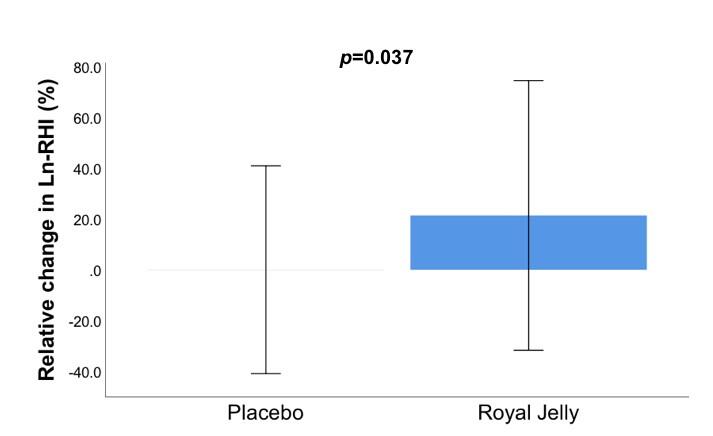A research group led by Assistant Professor Koichiro Fujisue and Professor Kenichi Tsujita from the Department of Cardiovascular Medicine, Graduate School of Medical Sciences, Kumamoto University conducted a joint research project with Sugi Bee Garden to examine the effect of royal jelly on vascular function. The results of this showed that patients who consumed royal jelly showed an improvement in vascular endothelial function. According to Assistant Professor Fujisue, "If we can improve the vascular endothelial function involved in the onset of arteriosclerosis with food, we can contribute to maintaining and improving health without the risk of side effects."
The study group conducted a double-blind, randomized controlled trial with 100 healthy volunteers who were assigned to the royal jelly intake group or the placebo group; each group took their respective treatment orally for 4 weeks. The data of the 100 volunteers (42 in the placebo group and 46 in the royal jelly intake group, excluding those who met the exclusion criteria) were analyzed. The royal jelly intake group showed greater change in RHI (an index of peripheral vascular endothelial function) measured before and after the test and improvement in vascular endothelial function. In addition, improvements in ALT and γGTP, indicators of liver function, were observed in the royal jelly ingestion group. Furthermore, no increase in blood glucose levels or development of adverse events were seen during the 4-week observation period, confirming the safety of royal jelly.
The results revealed that royal jelly improved vascular endothelial function, an early indicator of arteriosclerosis. Previous studies have shown that alcohol use and metabolic syndrome can lead to liver dysfunction caused by fatty liver disease, which is also associated with arteriosclerosis. The results suggest that royal jelly may be effective in preventing arteriosclerosis and the liver dysfunction associated with it.

(J Atheroscler Thromb. 2021 Sep 28. doi.org/10.5551/jat.63044Online ahead of print.)
Assistant Professor Fujisue said, "I had a hard time formulating a research plan for healthy people, but I was able to show the effectiveness of royal jelly without adverse events. I plan to develop new treatments to prevent arteriosclerosis in the future."
This article has been translated by JST with permission from The Science News Ltd.(https://sci-news.co.jp/). Unauthorized reproduction of the article and photographs is prohibited.




